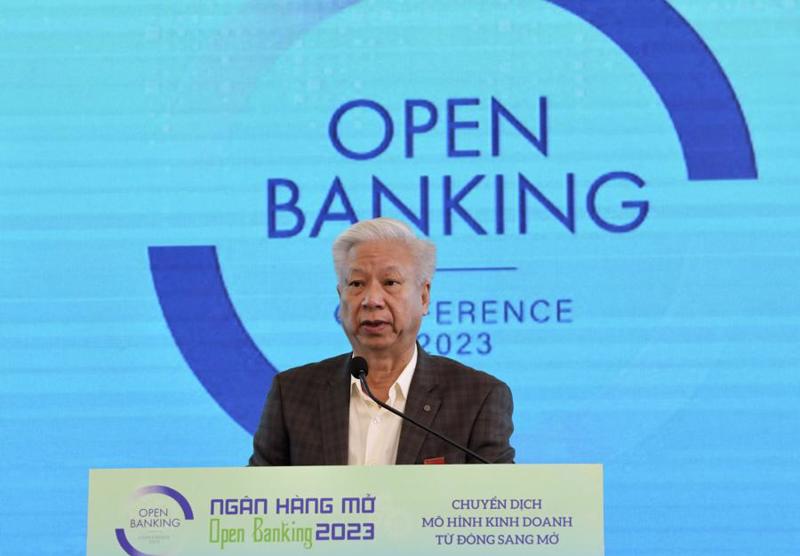The Open Banking 2023 conference, co-hosted by VnEconomy / Vietnam Economic Times (VET) and the Department of Information Technology, the Payment Department, and the National Payment Corporation of Vietnam (NAPAS) at the State Bank of Vietnam (SBV), was held on the afternoon of December 7 with a theme on transitioning business models from closed to open mode.
This was the first specialized conference of its kind, bringing together commercial banks, payment intermediaries, fintech companies, and most notably the Information Security Department at the Ministry of Information and Communications.
In his opening remarks, Mr. Dao Quang Binh, General Managing Editor and General Director of VnEconomy / VET, noted that the banking sector, as the lifeblood of the economy, holds a pivotal role. The vigorous digital transformation within the banking industry will serve as a driving force for rapidly advancing the digitalization of the entire economy. In recent years, many banks have proactively shifted their business models from traditional approaches towards engaging with customers through online channels, eliminating barriers in space, time, and physical context. This forms the foundation for the banking sector to progress further in the comprehensive, robust, and swift transition towards Open Banking.
Mr. Pham Tien Dung, Deputy Governor of the SBV, emphasized that the conference takes place in the context of digital transformation being considered a top priority in the banking industry for various reasons. It helps banks enhance operational efficiency by rationalizing and automating processes; improves readiness for the future and enhances the customer experience; and bolsters competitiveness in a rapidly-changing ecosystem. It also improves service quality, reduces costs, and increases profitability. Digital transformation helps maintain good profit margins, regenerates human and monetary assets, and sustains competitiveness in a challenging market.
“One of the breakthrough technologies associated with Industry 4.0 that allows data sharing through open application programming interfaces (Open API) has been researched and implemented by some Vietnamese banks in payment activities, electronic customer identification, and the supply of innovative financial products and services,” said Mr. Dung. “Open Banking - Open API is a new field in terms of both technical and legal aspects, not only in Vietnam but also worldwide. The challenges and difficulties in implementing Open API are not only technological but also involve changing perceptions and legal frameworks. Successfully implementing a legal framework for Open API will create conditions for the fintech community to provide new innovative services, meeting the increasing demands of customers in line with global developments in banking services.”

The conference focused on highlighting the following groups of issues: (i) Clarifying the concept of “Open Banking”; (ii) The values that Open Banking bring to participating entities, including banks, payment intermediaries - fintechs, and end-users; (iii) Operational mechanisms to optimize efficiency when synchronously implementing the Open Banking model on a broader scale compared to individual connections; and (iv) Challenges in implementing Open Banking.
It also proposed several initiatives. First, the issuance of legal regulations requiring appropriate data sharing in line with Vietnam’s current context. With mandatory implementation regulations and a strict legal framework, the Open Banking model will quickly expand with many participants, meeting the digital transformation goals of the banking industry. State agencies can easily monitor and implement timely measures to promote the development of Open Banking. Safety and information security will also be closely monitored, reducing operational risks that may arise during implementation. With this model, State management agencies review the issuance of a framework regulation for the implementation of Open Banking / Open API (regulations on data sharing, information security, and types of provided APIs), with detailed provisions on API standards and data security and customer authentication.
Second, the issuance of regulations on the conditions and obligations of parties participating in Open Banking, as well as standards for security and safety. If successfully implemented in Vietnam, Open Banking will drive the strong development of financial and non-financial services with greater convenience provided to customers. This process indirectly promotes widespread digital transformation in the banking industry to meet the technological requirements and the increasing demand for products and services from customers, thereby enhancing the competitive advantage of banks during Industry 4.0.









 Google translate
Google translate